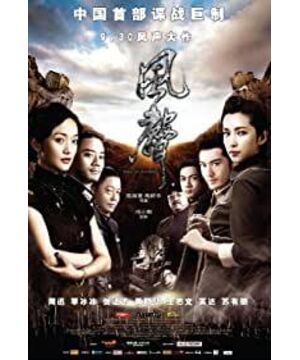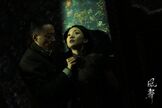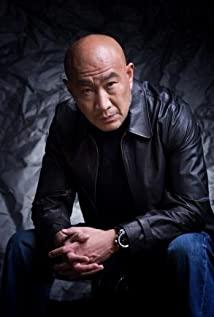So I saw a lot of SM-style violence in "The Sound of the Wind". I have no doubt that this film is politically correct, but the blood that fills the screen makes me hard to let go - Su Youpeng's corpse floating in a pool of blood, Zhang Hanyu's head With the needles full of needles in it, Yingda shot herself with a gun, and electric chairs and torture were commonplace. But what shocked me the most was that the female No. 1 Zhou Xun was forced to ride on a thick hemp rope and was pulled and rubbed back and forth - and then there was blood gurgling (of course, there was no direct shooting).
Mai Jia adapted his own novel. I haven't read the original. From the film alone, it's full of SM flavor. I even regarded "The Wind" as the Chinese version of "Inglourious Basterds" - with the title of "politically correct", I started to kill. Of course, the technical content of the film is unquestionable: when a group of people are taken to the castle-like building for screening, I immediately think of Agatha Christie's "No One Survives" - a full-fledged sense of reasoning. come. It should be noted that domestic films nowadays tend to be spectacles. The audience can guess who the villain is as soon as the actor shows his face, but "The Wind" has to make a fuss about the intellectual game. It can be seen that there are still two diamonds.
It's a pity that the characters died too quickly. According to my assumption, it was delayed until the last few people were there, and then the plot exploded to a climax in a relatively concentrated time and space, revealing the true identity of the "old ghost", and then another showdown of good and evil. , isn't it happy? It's a pity that when it was nearly ninety minutes, Zhou Xun came to Li Bingbing with a sincere confession, and I knew the spring was coming. Of course, in the end, the whole mystery will be clearly explained to the audience through the character dialogue. Otherwise, Chinese audiences who are not quite used to the reasoning film will walk out of the theater in confusion, which is still detrimental to the word-of-mouth promotion of the film - as expected, Zhang Hanyu After taking up this responsibility, the final burden is: Zhang himself is Zhou Xun's boss "Old Gun".
This is a bit of a conspiracy, but it is better to make it into the mystery, and it is better to make up the Wang Puppet Secret Service Director played by Wang Zhiwen as an "old gun". And Zhou Xun's statement of using corpses to transmit information is also a bit unreliable (Japanese devils won't burn corpses and destroy traces?); As for Zhang Hanyu's humming opera to transmit information, the operability is also very problematic (people can still hum while they are tossed out. Master the subtle changes in the tune?); After reading the whole "The Sound of the Wind", it is actually mainly talking about Morse code - this thing is inevitably suspected of being fried rice, which is a pity. If it were me, I would make the scene where the Japanese army forced Zhou Xun into submission through her family into a process of delivering information - Zhou Meimei had long expected that the enemy would threaten her with her family, and at the moment when she was talking to her mother, she passed the information in code. : In the entire "Wind", this is the only way for intelligence officers to communicate with the outside world. The role of Zhang Hanyu can be compiled into a central intelligence officer. The intelligence officers of the Kuomintang and the Communist Party did not know each other at first, and then cleverly formed an alliance in the struggle against Japan. Finally, our party intelligence officers sacrificed and helped the Kuomintang intelligence officers to send information. . Finally, let’s add an introduction. Decades later, the gray-haired former Kuomintang Central Intelligence Officer came to the mainland to sweep the graves of his comrades who fought side by side...
Of course, it was made like this, and "The Wind" is already a leader in domestic movies. . Facts have proved that relying mainly on mainland actors can also support a decent type film (the male concubine played by Su Youpeng is also very good). The long-lost spy war theme has returned to mainland audiences, which itself is a sign of the strong recovery of domestic movies - but the problem is also here. Our movie box office has been erected, but the cultural value of the film seems to be impotent. It should be noted that there is no grading system in our country. "The Wind" has become a patriotic education film on the occasion of the 60th anniversary of the Daqing. How will children be affected by watching such a film? On MPAA, "The Wind" is at least R-rated!
Since the ban of Lust, Caution, the relationship between the body and revolution is no longer widely discussed by domestic film artists, but "The Wind" provides an interesting text. When Huang Xiaoming's Japanese officer strips Li Bingbing's clothes off (another inappropriate scene), he says that the best way to destroy a person's will is to make her feel that her body does not belong to her but to the enemy.
At that moment, I suddenly had the trance of Foucault's reincarnation: the post-structuralist relationship between the body and the revolution was revealed by a Japanese prophet-like sentence. Revolution needs violence, and revolution needs the body of the revolutionaries, so SM-style torture is the best way to deal with revolutionaries - and for women, the loss of sexual power becomes a by-product of the loss of body sovereignty.
In this sense, the "old ghost" is nothing more than a Wang Jiazhi who saved the evening festival.
(Southern.com's special article, please indicate the source for reprinting!)
View more about The Message reviews











